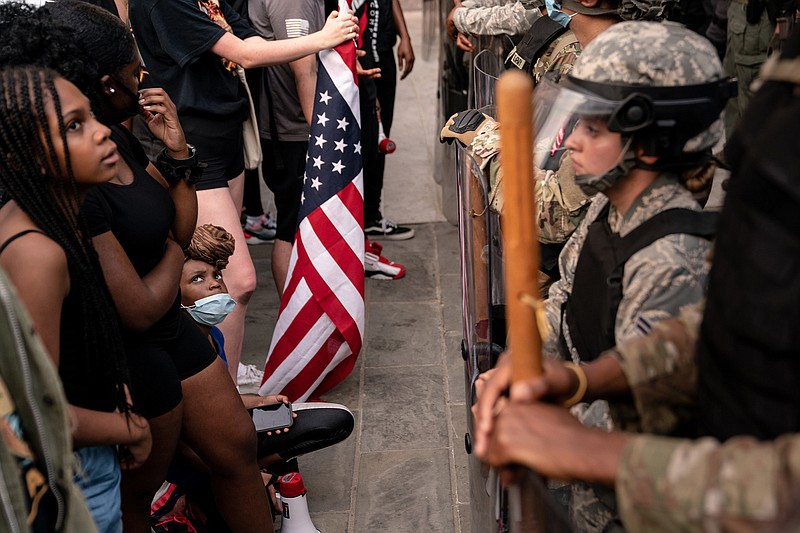WASHINGTON -- American diplomats who are the global face of the United States are struggling with how to demand human rights, democracy and rule-of-law abroad amid concerns overseas and criticism at home over the Trump administration's strong-arm response to the protests across the country.
Diplomats are being confronted by the unrest arising from the death of a black man in police custody in Minneapolis, assaults by security forces on protesters and journalists nationwide, violent protesters causing damage and looting, and a tear-gas attack last week on protesters outside the White House.
In private conversations and social media posts, career diplomats at the State Department and the U.S. Agency for International Development have expressed anger after the killing of George Floyd and President Donald Trump's push to send the military to quell demonstrations.
Diplomats say the violence has undercut their criticism of foreign autocrats and called into question the moral authority the United States tries to project as it promotes democracy, and demands civil liberties and freedoms across the world.
"As American diplomats, it is our job to explain America to the world," Eric Rubin, a career diplomat and former ambassador to Bulgaria, wrote in a letter Wednesday to the union of American foreign service officers that he leads. "We have always pointed to our story as being worthy of emulation."
"This week, we have been forcefully reminded that we still have a long way to go as a nation," Rubin said.
Around the world, diplomats at U.S. missions are bearing witness to fresh human rights protests -- but ones aimed at the United States, not at oppressive leaders of foreign countries.
In a statement, the State Department acknowledged challenges that were "difficult to address," but maintained that the United States is devoted to free speech and assembly and the rule of law.
"The United States is proud of the role we have played in defending and advancing human rights and fundamental freedoms around the world," the department said. "Governments that take human rights seriously are transparent, and welcome conversations about addressing concerns and making improvements."
This year, diplomats have already had to grapple with representing a president and government that have been widely criticized for their failures in handling the coronavirus pandemic, which have led to the deaths of more than 100,000 people in the United States and a crippled economy.
Current officials who described frustration and concern in the diplomatic corps spoke only on the condition of anonymity for fear of retribution or of endangering their careers.
Rep. Tom Malinowski, D-N.J., who served as assistant secretary of state for democracy, human rights and labor in the Obama administration, said "the use of the military to violently disperse peaceful protesters in front of the White House was the biggest gift we could possibly have given to Putin or Xi Jinping and to every other dictator around the world who delights in arguing that America's government is no different than theirs."
"Most sophisticated dictators don't argue they're angels," he added. "They argue that America is sanctimonious and hypocritical because we do the same things they do."
Several diplomats pointed to the case of Tianna Spears, a black foreign service officer who resigned last year after making repeated -- and unheeded -- complaints of being harassed by Customs and Border Protection officers when entering the United States from her assigned post in Mexico.
In a blog post widely shared among diplomats, Spears described being accused of looking like a drug dealer and carrying counterfeit identification, including her diplomatic passport. At one point, she recounted, one U.S. border officer told her to "look at the ground" when talking to a man.
"How many Black women have fled the State Department in the last five years?" she wrote. "I felt angry that this career opportunity I dreamed of since I was 19 was something I had to flee to save myself."
Customs and Border Protection, an arm of the Department of Homeland Security, did not respond to requests for comment. In a brief interview Wednesday night, Spears said she believed the border security agency never acted on her complaints.
In this moment, top State Department officials and sitting ambassadors have yet to publicly address institutional discrimination in their corps, as some military commanders did last week. After this article was posted online Saturday, the department's South and Central Asia bureau announced on Twitter that it was committed to "promoting inclusivity" -- but no official's name was attached to the statement.
In an interview with Fox News last Sunday, Secretary of State Mike Pompeo expressed condolences to Floyd's family and called the actions of the Minneapolis police officers charged in his killing "abhorrent."
He also applauded the Trump administration's response -- not only in investigating Floyd's death, but also in offering to send military personnel to states partly to stop "violent protesters."
Pompeo's comments came the day before federal police forcefully cleared peaceful protesters near the White House so that Trump could walk to a church that had been burned by rioters. A leading bishop and other clergy said they were angered by the incident.
On Tuesday, Pompeo met with survivors of the 1989 massacre of peaceful protesters by the Chinese military around Tiananmen Square in Beijing. But in the run-up to Thursday, the 31st anniversary of the massacre, it was images of National Guard personnel and armored vehicles in the streets of the U.S. capital that proliferated online and on television screens around the world.
